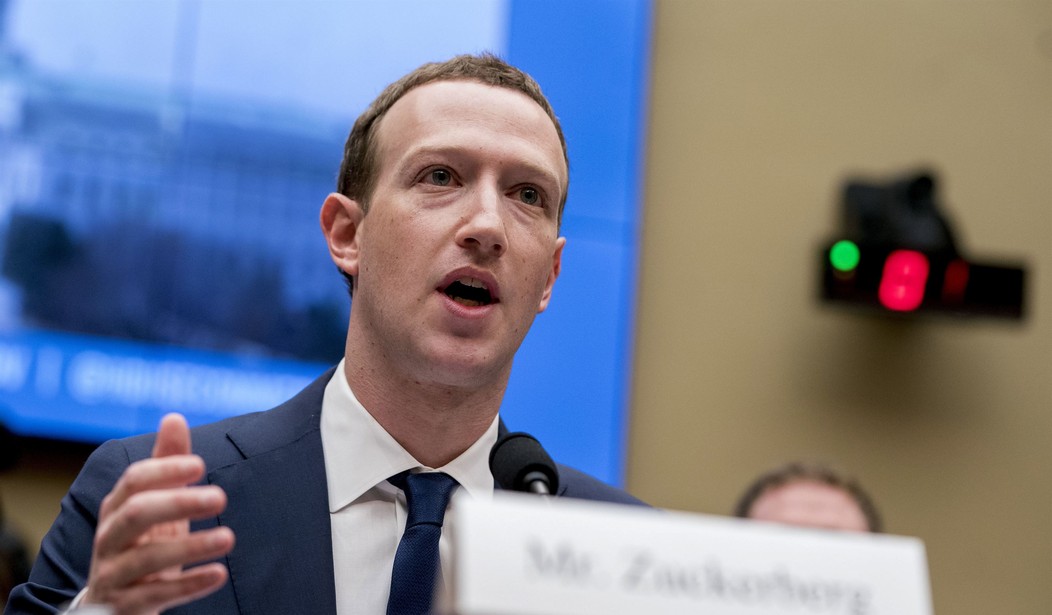Please, regulate me!
That was Facebook founder Mark Zuckerberg's message to Congress recently.
"Lawmakers often tell me we have too much power over speech, and frankly I agree," he wrote in an op-ed. "(W)e shouldn't make so many important decisions ... on our own."
It sounds so self-sacrificing.
But give me a break. Big companies use regulation to their advantage.
His smaller competitors can't afford the squads of "compliance officers" that Facebook employs.
"You, as a company, welcome regulation?" Sen. Lindsey Graham (R-SC) asked Zuckerberg during a congressional hearing.
"If it's the right regulation, then yes," replied the CEO.
"Would you work with us in terms of what regulations you think are necessary in your industry?"
"Absolutely," replied Zuckerberg.
Zuckerberg's no dope. He sees which way the wind is blowing. He issued his plea to be regulated after receiving months of criticism from politicians.
If he cooperates early and enthusiastically, Facebook is likely to get to work with the regulators to shape the rules.
This is sad for two reasons.
One, the First Amendment says Congress "shall make no law ... abridging the freedom of speech." I'd think Zuckerberg would know that, but no, he called for government to "require companies to build systems for keeping harmful content to a bare minimum."
Currently, his own website is a wonderful forum for all kinds of useful speech. There's hateful speech, too, but it's the private company's job to decide whether to police that, not government's.
Recommended
The second reason Facebook working with regulators is sad is that if anyone should fight for permissionless, unregulated innovation, it should be people like Mark Zuckerberg.
It's no accident that the amazing wealth creation that brought us Facebook, Google, Instagram, Microsoft, Amazon, etc., happened in the two big metropolitan areas farthest from Washington, D.C.
As Yaron Brook, chairman of the Ayn Rand Institute, says: "Microsoft in the early 1990s was the largest company in the world, incredibly successful. They spent exactly zero dollars on lobbying, on cronyism, on lawyers. They had no presence in Washington, D.C. -- not a single lawyer, not a single building."
Instead of investing in lawyers and lobbyists, Microsoft spent money on technology.
But then the sleepy codgers in Washington, D.C., noticed Microsoft's success.
"They were literally brought in front of Congress," recounts Brook, "yelled at by a Republican, Orrin Hatch from Utah. He said, 'You guys need to get involved here in Washington, D.C. You need to build a building here, hire lawyers here.' ... The unspoken text: 'You need to bribe me.'"
The company didn't immediately obey.
"Microsoft said, you know what? You leave us alone," says Brook. "We're busy. We're running the biggest company in the world. There's a lot to do!"
But that wasn't the end of it.
"Six months later, knock on the door at Microsoft: 'We're from the Justice Department and we're here to prosecute you because you're offering ... customers a product for free,'" paraphrases Brook. "Internet Explorer. At a time when (customers) were paying money for Netscape, they offered it for free."
The government called that a violation of anti-trust law. Free services might make Microsoft too popular.
"For 10 years they had to fight that lawsuit," says Brook. "They lost. They got regulated. They got controlled. Guess how much Microsoft spends today in Washington, D.C.? Tens of millions of dollars."
A company that should focus on pleasing customers had to start thinking more about pleasing government.
Today, "they have a beautiful building about equal distance from the White House and from Congress. They have lawyers, lobbyists, they spend a lot of money," says Brook, "and indeed a lot of other tech companies like Google learned the lesson."
The lesson is that if you don't want politicians destroying your business, you must go to Washington to give them money. Kiss their rings.
"A lot of the lobbying and so-called cronyism," explains Brook, "is self-defense."
Yes, Zuckerberg is acting in self-defense, but it's still ugly. And this crony capitalism is a threat to future innovation. Entrepreneurs will learn to do things government's way instead of heeding the market.
"If we really want to end cronyism, reduce the power of politicians over our lives," argues Brook, correctly. "Separate economics from state."

























Join the conversation as a VIP Member